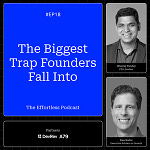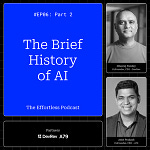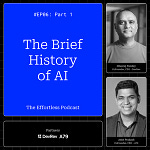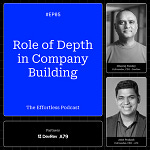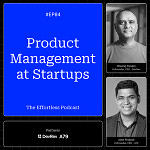Hosts:
Dheeraj Pandey - Co-Founder & CEO of DevRev, former CEO of Nutanix
Amit Prakash - Co-Founder & CTO of ThoughtSpot, former engineer at Google and Microsoft
Summary:
In the second episode of The Effortless Podcast, ThoughtSpot Co-founder Amit Prakash and DevRev Co-founder Dheeraj Pandey dive into how to determine if you’re built for startup life, what it takes to succeed, and how to evaluate a company’s founding team and vision. They break down the risks, mindsets, and frameworks necessary for both joining a startup and creating lasting impact. They cover the realities of startup culture, balancing ambition with practical skills, and the subtleties of “founder-market fit.”
Key Takeaways:
Risk Tolerance is Essential: Jumping into a startup—whether founding or joining early—demands the ability to let go of security and comfort.
Founders’ Traits Matter: Evaluating authenticity, adaptability, and their conviction about the product and market is critical when assessing startups.
Design Goes Beyond Aesthetics: A startup's design focus should extend from UI to algorithmic and systems thinking, setting the foundation for scalable impact.
Market Thinking is Critical: Founders need both product management skills and market awareness to ensure product-market fit and sustainable growth.
Prepare for Conflict: Conflict within startups often leads to necessary innovation. Founders and early employees should be ready to embrace and resolve these challenges.
Detailed Insights:
1. What It Takes to Join a Startup
Self-Evaluation of Risk: Founders and early employees must assess their own tolerance for uncertainty. Dheeraj reflects on how his own startup journey required him to take financial risks and adapt to various uncertainties, seeing this adaptability as an invaluable life skill.
Authenticity and Conviction in Founders: Amit and Dheeraj discuss authenticity as a key marker of founders who can weather the highs and lows of a startup journey. Authenticity is not just honesty; it’s a balance of humility and strong vision that inspires others.
Hunger and Resilience: Amit points to the need for personal resilience in navigating the emotional ups and downs of a startup environment, saying that those who thrive at startups are those who can ride these waves without losing focus on the long term.
2. The Design Advantage for Startups
Beyond Surface-Level Design: For founders, the dedication to design should permeate all levels of the product, from user experience to backend algorithms. Amit shares an example from his time at ThoughtSpot, where early design decisions reflected the company’s long-term goals.
Essentialism in Building: Drawing on principles from Greg McKeown’s Essentialism, Dheeraj and Amit argue for prioritizing efforts, building only what’s essential for learning, and avoiding unnecessary complexity.
Balancing Speed and Quality: Dheeraj stresses the importance of balancing speed to market with sustainable design. For example, rather than cutting corners for short-term solutions, he suggests designing systems with scalability in mind.
3. Identifying a Founding Team’s Vision and Market Awareness
Product Market Fit: Product-market fit is an evolving goal. Startups need a strong vision, but they should also be ready to adapt as market demands and competitive landscapes shift. Dheeraj argues that successful founders focus both on long-term vision and shorter-term milestones.
Founder’s Vision vs. Execution: Startup success is often about translating big ideas into actionable missions. Amit recalls ThoughtSpot’s strategic decision to transition fully to the cloud in response to market trends—a decision that reflected a deep commitment to building for the future.
Curiosity and the Five Whys: Curious founders are often better able to address the challenges of both product and market development. Candidates should ask founders about the reasoning behind their product decisions, as this reflects both their adaptability and depth of market understanding.
4. Culture and Conflict in Startup Environments
Building Meritocratic Cultures: Amit shares that larger companies often face “peanut butter” culture, where efforts are spread thinly to keep everyone happy. In contrast, startups are forced to prioritize merit, rewarding impactful contributions.
Handling Internal Conflicts: Embracing conflict as an opportunity for discovery is crucial. Dheeraj discusses a powerful cultural lesson from Nutanix: that the end-user should be the ultimate tiebreaker in decisions.
Balancing Product and Sales Cultures: Dheeraj and Amit discuss the importance of both product and sales mindsets, especially as a startup scales. Building a great product without strong distribution will stymie growth, while over-focusing on sales risks compromising the product’s integrity.
5. Assessing Financial Pragmatism in Founders
Founders’ Approach to Fundraising and Financial Planning: Potential employees should gauge a founder’s ability to secure funding, but more importantly, their discipline in using it. A founder who is financially savvy will stretch dollars effectively and avoid risky spending habits.
Global Talent: The global talent landscape is increasingly accessible, enabling startups to scale with remote teams. Dheeraj highlights the importance of founders’ ability to bridge distance and create culture across distributed teams, a skill that reflects a modern understanding of organizational design.
Episode Breakdown
{00:00:00} Intro: Reflections on entrepreneurship and life’s highs and lows.
{00:01:06} Leaving the Bird in Hand: Evaluating readiness for an entrepreneurial journey.
{00:02:20} Anti-Patterns: Who should not pursue entrepreneurship?
{00:04:09} Navigating Bureaucracy: Testing patience in large companies.
{00:06:53} Startup Velocity: Thriving in fast-paced environments.
{00:08:27} The Role of Design: Building delight and creating value.
{00:12:00} Grassroots Selling: The evolving importance of design in tech.
{00:13:39} Staying Relevant: Balancing paranoia about long-term and short-term risks.
{00:16:25} Money vs. Risk: Evaluating the financial trade-offs.
{00:18:14} Life Lessons from Entrepreneurship: Resilience, uncertainty, and growth.
{00:23:00} Imposter Syndrome: Overcoming self-doubt to take risks.
{00:25:10} The Marshmallow Test: Delaying gratification for long-term success.
{00:31:00} Embracing Conflict: Turning challenges into growth opportunities.
{00:36:00} Startup Hustle: Navigating external vs. internal friction.
{00:38:00} Meritocracy and Momentum: Building impact in large vs. small organizations.
{00:43:44} Evaluating Startups: How to assess founders, culture, and vision.
{00:48:34} Product-Market Fit: Balancing conviction and adaptability.
{00:52:25} Design and Long-Term Thinking: Building beyond the next milestone.
{01:13:00} Diversity and Hiring: Evaluating the bar for talent.
{01:17:00} Founders and Fundraising: Passion, authenticity, and the ability to dream big.
{01:20:59} Founder-Market Fit: Transferrable skills and long-term learning.
{01:25:09} Closing Thoughts: Evaluating risks and embracing the entrepreneurial journey.
References:
Books
Essentialism: The Disciplined Pursuit of Less by Greg McKeown
Effortless: Make It Easier to Do What Matters Most by Greg McKeown
Articles
With their deep-rooted experience and insights, Amit and Dheeraj offer a compelling guide for anyone considering a leap into startup life, whether as a founder or an early team member. In understanding the complex trade-offs, risks, and rewards of this path, listeners will gain a clearer picture of what it means to build and grow something from the ground up.




